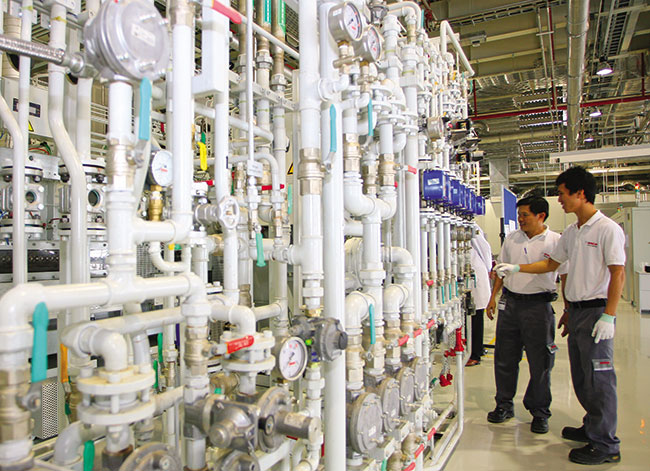Tribunal to set right disputes

EU investors will take solace from being able to use a tribunal for particularly thorny disagreements
Bruno Angelet, Ambassador and Head of the EU Delegation to Vietnam, said that regarding the settlement of investor-state disputes, a unique feature of the Vietnam-EU Free Trade Agreement (EVFTA) was the agreement to set up an investment tribunal system.
“Vietnam is our first trade partner to endorse this innovative mechanism proposed by the EU to its partners. It will considerably increase Vietnam’s attractiveness for European investment,” Angelet told EuroCham’s Whitebook launching ceremony last week.
According to the EVFTA’s Chapter 13 on dispute settlement, the deal creates a framework to resolve any future disagreements that may occur between the EU and Vietnam about the interpretation and implementation of most aspects of the agreement.
The system is intended as a last resort should the parties fail to find a solution by other means. Should parties fail to reach an agreement through formal consultation, they can request the establishment of a panel, made up of independent legal experts. As an alternative to a formal settlement mechanism for disputes, the EU and Vietnam also set rules that will allow for mediation to tackle measures that adversely affect bilateral trade and investment.
According to EuroCham in Vietnam, with such an investment tribunal system stipulated in the EVFTA, investors may have their disputes resolved more conveniently and impartially.
In past years, when a dispute happened, investors were often reluctant to settle the issue in Vietnamese courts because they felt uncertain about the independence of the judges. In cases where the value of the contract was substantial, they would choose instead to resolve it by international arbitration. Although international arbitration is often costly and time consuming, an international arbitral award is generally enforceable in most jurisdictions around the world under the 1958 New York Convention on the Recognition and Enforcement of Foreign Arbitral Awards.
According to the People’s Supreme Court, from January 2005-June 2014 the number of applications for the recognition and enforcement of international arbitral awards was 52 in Hanoi and 52 in Ho Chi Minh City, as well as a handful in other localities.
For example, in July 2014 the US’ South Fork Development Company tried to sue the Vietnamese government for $3.7 billion. However, the International Arbitral Tribunal ruled in favour of the Vietnamese government.
In 2004, South Fork was licensed to develop a 600-hectare property in the south-central province of Binh Thuan, which included a five-star luxury resort, golf courses, luxury apartments, and entertainment facilities.
In December 2009, the provincial People’s Committee gave 333 hectares to South Fork to develop the project. However, in 2010 the committee revoked the investment certificate due to long construction delays, but South Fork took the committee to the International Arbitration Tribunal, demanding $3.7 billion in compensation for delays in releasing land to the investor.
South Fork blamed the committee for having allowed the locally-invested Duong Lam Company to exploit titanium on the project’s site without its approval, causing delays in project construction. The committee, however, argued that South Fork had to be responsible for the delay as it had previously signed an agreement with Duong Lam for the exploitation.
In another case, in June 2012, Swiss-based Louis Dreyfus Commodities Suite SA asked Vietnam’s Ministry of Justice and Hanoi’s People’s Court to recognise and enforce the International Cotton Association arbitral tribunal’s ruling against locally-owned Dong Phat Joint Stock Company.
In October 2011, the tribunal tried a dispute in sales contracts involving the two companies. It finally required Dong Phat to return over $748,000 plus interest to the Swiss company.
What the stars mean:
★ Poor ★ ★ Promising ★★★ Good ★★★★ Very good ★★★★★ Exceptional
Latest News
More News
- US firms deepen energy engagement with Vietnam (February 05, 2026 | 17:23)
- Vietnam records solid FDI performance in January (February 05, 2026 | 17:11)
- Site clearance work launched for Dung Quat refinery upgrade (February 04, 2026 | 18:06)
- Masan High-Tech Materials reports profit: a view from Nui Phao mine (February 04, 2026 | 16:13)
- Hermes joins Long Thanh cargo terminal development (February 04, 2026 | 15:59)
- SCG enhances production and distribution in Vietnam (February 04, 2026 | 08:00)
- UNIVACCO strengthens Asia expansion with Vietnam facility (February 03, 2026 | 08:00)
- Cai Mep Ha Port project wins approval with $1.95bn investment (February 02, 2026 | 16:17)
- Repositioning Vietnam in Asia’s manufacturing race (February 02, 2026 | 16:00)
- Manufacturing growth remains solid in early 2026 (February 02, 2026 | 15:28)
















 Mobile Version
Mobile Version